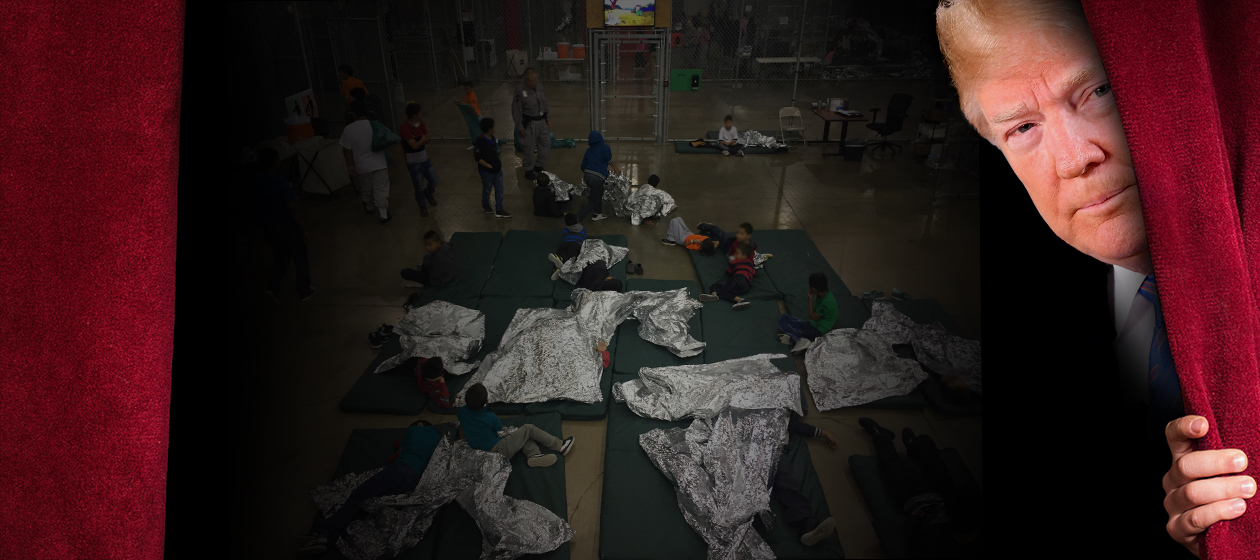How Trump drew back the curtain on America's immigration cruelty
Feast your eyes!


President Trump has abruptly reversed course on his administration's vicious policy of separating migrant children from their parents. That decision came after a dizzying, circus-like week in which the president and his inept coterie of minions couldn't decide whether to admit that the policy existed, or if it did, whether it was worth defending on its own terms or instead nonsensically blaming it on the Democrats. Congress, as always, looks paralyzed by divisions inside the GOP.
Hoping for relief from the bipartisan condemnation and media firestorm, the president ended that drama himself, at least for the moment, when he signed an executive order requiring children to be detained with their parents instead of independently. But President Trump may have ignited a blaze he can't put out so easily.
The policy of separating parents from their children was not just endlessly cruel and morally bankrupt. It will also potentially cause catastrophic political damage to Trump and the GOP, and cause an irreversible shift in public opinion on America's immigration practices.
The Week
Escape your echo chamber. Get the facts behind the news, plus analysis from multiple perspectives.

Sign up for The Week's Free Newsletters
From our morning news briefing to a weekly Good News Newsletter, get the best of The Week delivered directly to your inbox.
From our morning news briefing to a weekly Good News Newsletter, get the best of The Week delivered directly to your inbox.
Overwhelming majorities of Americans will eventually choose to have children, and no one is more viscerally affected by kids in emotional pain than people with babies of their own. As the father of a 9-day-old infant, I can tell you that those tapes of children wailing inconsolably inside detention centers just about broke me in a way that they wouldn't have just last month.
That universal protective instinct is perhaps one reason why the president, in this instance, was not able to instantly hypnotize his entire following into supporting his policy. There was greater-than-normal pushback from other Republicans, including a damning Washington Post op-ed from former first lady Laura Bush, a letter signed by 13 GOP senators, and the spectacular tweetstorm from former top GOP campaign strategist Steve Schmidt renouncing his membership in the Republican Party, in which he skewered GOP elites for submitting to "internment camps for babies" and argued that "these complicit leaders will carry this shame through history."
The polls showing greater than 2-to-1 majorities of Americans opposing the Trump administration's unconscionable family separation policy spoke for themselves, and ultimately forced the administration to capitulate. Whether there will be lasting political damage from this gross abuse of state power depends on whether the president really wants the issue to go away or, as Talking Points Memo's Josh Marshall speculated, whether he is hoping for a court to restore the policy so he can shrug his shoulders and say there's nothing he can do unless Congress acts. It's the same two-step he has thus far successfully used to evade responsibility for the DACA crisis he instigated last September.
But the president and his nativist advisers, chiefly Stephen Miller, may have done something even more damaging to their dark cause: woken up millions of citizens to the barbarity of our border policies more generally. During the Obama administration, many people on the left either did not see or did not want to see how the militarization of the U.S. border and the investment of ever-greater sums of money into security and detention were inflicting savage brutality on migrants and their families, turning border areas into de facto war zones and leading to a vast expansion of the carceral state. While the Obama administration may have been hemmed in politically, it also showed little interest in the human cost of its border policies. Meanwhile, immigration activists were unable to get the center-left to recognize the scale of the problem or join with them to pressure the administration.
A free daily email with the biggest news stories of the day – and the best features from TheWeek.com
Part of the explanation is that a long-term fix for the country's broken immigration system always seemed to be just around the corner. As the journalist (and my friend) Daniel Denvir has written, for two decades Democrats played along while Republicans demanded more money for "border security" in exchange for future promises of comprehensive immigration reform that would include a path to citizenship for undocumented immigrants. Yet every single time, Republicans have been unable to deliver the votes to pass bipartisan immigration bills. Serious efforts to pass broad legislation failed in both 2007 and 2013 because the GOP couldn't or wouldn't bring enough members of their caucus along.
The result of repeatedly escalating "security" funding without any kind of reform whatsoever has been that, as Denvir wrote earlier this week, Bill Clinton, George W. Bush, and Barack Obama "constructed a mercilessly smooth system linking mass incarceration to a terrifyingly gargantuan deportation pipeline" long before Donald Trump descended down the elevator in the summer of 2015 and dragged us all down into the depths of hell with him. Children were put in cages, families were separated, and America mostly looked the other way until these policies were made even more immoral and gratuitous by a man who plainly lacked the emotional core to be bothered by any of it.
But people are paying attention now. And the president's adversaries may start to ask why any kind of migration results in extended jailing of families (even if they are kept together), and what moral calculus could possibly justify the physical and psychological destruction visited on these innocents and their families by either separation or prison. Even if migrants cross the border illegally multiple times, would it not be cheaper to explore alternatives to incarceration that might be both more humane and less costly?
People may also be starting to wonder, rightfully, why all of this gratuitous barbarism is being deployed at all. Illegal border crossings and apprehensions are down precipitously from their Bush-era heyday, even if they've ticked up a bit this year due mostly to violence in Central America. Activists, many of whom felt like they were beating their heads against the wall during the Obama era, are getting the kind of funding and buy-in they need to transform our discourse around this issue. The result has the potential to be politically potent: As with Medicare for all, the issues of reining in ICE, reducing needless cruelty to migrants, and creating a path to citizenship for undocumented immigrants could become litmus test issues for Democratic politicians with national aspirations. That's certainly where the party's base is, which makes it all the more mystifying why Senate Minority Leader Chuck Schumer is basically deferring to the president here rather than rallying supporters with his own vision.
The greatest miracle of all would be if this crisis opens up the possibility of talking about the real reasons for the influx of migrants and asylum-seekers from Central America and parts of Mexico: America is the world's single largest drug market, and the unending appetite for illegal drugs creates a daisy-chain of mayhem and suffering from our living rooms all the way into South America and beyond.
In 2014, RAND analysts estimated that Americans spent more than $55 billion a year on cocaine and heroin alone, most of which is produced and trafficked through Central American countries that have been torn apart by the consequences. The parastatal violence that accompanies drug manufacturing and distribution is predictable and tragic. State institutions are corrupted and destroyed, trust evaporates, and the social fabric unravels in ways that are difficult to stop or reverse. Because we bear enormous responsibility for creating this problem, we can't simply turn our backs on people fleeing the chaos or worse, deliberately create more human suffering for political sport.
Ironically, the Trump administration's cruel gambit may have opened the door to more radical and humane thinking about our borders. Denvir, in his forthcoming book All-American Amnesty, offers a critique of two decades of immigration policy, and suggests a policy framework for how to extract ourselves from the border security trap. I spoke with him yesterday, and he offered a set of forceful demands: "We must decriminalize unlawful entry and re-entry. We must demand that the mass incarceration and mass deportation be delinked — which will require that both systems also be dismantled." He also favors cutting the Border Patrol ranks and expanding, rather than constricting, refugee and asylum policies.
Such thinking might have been considered radical a few years ago. But in the wake of Trump's monstrous family separations, and with "Abolish ICE" the new rallying cry on the left, this vision suddenly has a real chance of becoming future policy.
David Faris is a professor of political science at Roosevelt University and the author of "It's Time to Fight Dirty: How Democrats Can Build a Lasting Majority in American Politics." He's a frequent contributor to Newsweek and Slate, and his work has appeared in The Washington Post, The New Republic and The Nation, among others.
-
 Panspermia: the theory that life was sent to Earth by aliens
Panspermia: the theory that life was sent to Earth by aliensUnder The Radar New findings have resurfaced an old, controversial idea
-
 What's a bridge loan and how could it make buying your next home possible?
What's a bridge loan and how could it make buying your next home possible?The Explainer This type of loan has both pros and cons
-
 The Week contest: Phone risk
The Week contest: Phone riskPuzzles and Quizzes
-
 Ghislaine Maxwell: angling for a Trump pardon
Ghislaine Maxwell: angling for a Trump pardonTalking Point Convicted sex trafficker's testimony could shed new light on president's links to Jeffrey Epstein
-
 The last words and final moments of 40 presidents
The last words and final moments of 40 presidentsThe Explainer Some are eloquent quotes worthy of the holders of the highest office in the nation, and others... aren't
-
 The JFK files: the truth at last?
The JFK files: the truth at last?In The Spotlight More than 64,000 previously classified documents relating the 1963 assassination of John F. Kennedy have been released by the Trump administration
-
 'Seriously, not literally': how should the world take Donald Trump?
'Seriously, not literally': how should the world take Donald Trump?Today's big question White House rhetoric and reality look likely to become increasingly blurred
-
 Will Trump's 'madman' strategy pay off?
Will Trump's 'madman' strategy pay off?Today's Big Question Incoming US president likes to seem unpredictable but, this time round, world leaders could be wise to his playbook
-
 Democrats vs. Republicans: which party are the billionaires backing?
Democrats vs. Republicans: which party are the billionaires backing?The Explainer Younger tech titans join 'boys' club throwing money and support' behind President Trump, while older plutocrats quietly rebuke new administration
-
 US election: where things stand with one week to go
US election: where things stand with one week to goThe Explainer Harris' lead in the polls has been narrowing in Trump's favour, but her campaign remains 'cautiously optimistic'
-
 Is Trump okay?
Is Trump okay?Today's Big Question Former president's mental fitness and alleged cognitive decline firmly back in the spotlight after 'bizarre' town hall event
